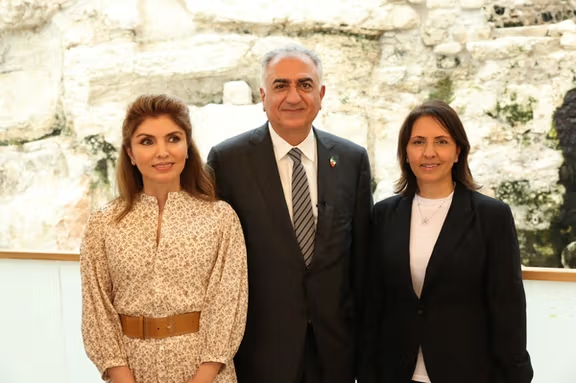Pahlavi’s Visit Opened Way To Revive Israel-Iran Ties – Intel Minister

Iran’s exiled prince Reza Pahlavi left Israel on Friday afternoon after five days of meetings with senior officials and visits to cultural and scientific centers.

Iran’s exiled prince Reza Pahlavi left Israel on Friday afternoon after five days of meetings with senior officials and visits to cultural and scientific centers.
Israel’s Intelligence Minister Gila Gamliel, who was officially hosting Pahlavi and his wife, Jasmine, during their five-day stay, said Friday that the Iranians and Israelis can move on the path of progress together.
The new path between the nations has just begun, she said, sharing a video of some of the highlights of the historic visit.
"The visit of the Iranian crown prince that I led this week is only the beginning on the way to bringing hearts together and building bridges between the nations,” she said in a tweet in Hebrew.
In other tweets both in Hebrew and Persian, the Israeli official said that Pahlavi is a brave leader in the eyes of Israel and the free world, adding that “Together we stand against the axis of evil and this is the beginning of the road.” Axis of evil was a term coined by the US administration of President George Bush in 2002 to refer to the Islamic Republic, Saddam's Iraq and North Korea.
Gamliel underlined that while the Islamic Republic is disrupting the security of Israeli borders, Pahlavi and Israeli officials are building bridges between the tow nations. She made the comment after a meeting between Pahlavi and Minister of Strategic Affairs Ron Dermer and National Security Advisor Tzachi Hanegbi.
On the last day of his trip, Pahlavi delivered a speech at University of Haifa, where he laid out his vision for a future democratic Iran and amicable ties between the two countries, which he described as rooted in over 2,500 years of history and based on the shared democratic values, including respect for the rule of law, human rights, and religious freedom.
He renewed his call to the international community “to decide which side of history they want to stand.” “Do they stand with us (opposing the Islamic Republic) or do they remain silent?” he said. Quoting Martin Luther King, Pahlavi said, “In the end, we will remember not the words of our enemies, but the silence of our friends.”
Pahlavi also visited the Baha’i World Centre in Haifa, saying that he was touched by their “message of unity and togetherness.”
Established by Bahaullah in the 19th century, the Baha’i faith initially spread in Iran and parts of the former Ottoman Empire. For nearly three centuries the Baha’is have been persecuted in Iran to varying degrees and subjected to mob attacks often instigated by the Shia clergy.
Supreme Leader Ali Khamenei has on several occasions called the Baha'i Faith a cult and in a religious fatwa in 2018 forbade contact, including business dealings, with followers of the faith. Baha'is, who number around 300,000 in Iran, say their rights are systematically violated and they are often harassed, forced to leave their homes and businesses, and are deprived of government jobs and university education.
During a press conference in Tel Aviv on Wednesday, Pahlavi said that Iranians are the extreme opposite of the country’s current rulers, and that the regime does not represent the Iranian nation. “They have no antagonism to any nation or any faith. I know that Iranians and Israelis see how important it would be for our future to be strategic partners, to work together, to address many issues. I come here to convey this message to Israeli citizens,” he said.
Referring to the 2020 US-brokered Abraham Accords aimed at normalizing relations between Israel, the United Arab Emirates and Bahrain, Pahlavi also expressed hope for a “Cyrus Accord” for peace between Tehran and Jerusalem.
While Pahlavi was promoting peace with the Israelis, Islamic Republic’s President Ebrahim Raisi threatened to destroy the Israeli cities of Tel Aviv and Haifa in an inflammatory speech in Tehran on Tuesday.

During his stay, Pahlavi visited the Wailing Wall and attended the ceremony to mark Israel's Holocaust Remembrance Day at the Yad Vashem memorial in Jerusalem. He also met with Prime Minister Benjamin Netanyahu twice and President Isaac Herzog. One of the main goals of Pahlavi’s visit was exploring ways to solve the water crisis in Iran with the help of Israeli experts. In line with this goal, he also visited Sorek Desalination Plant.